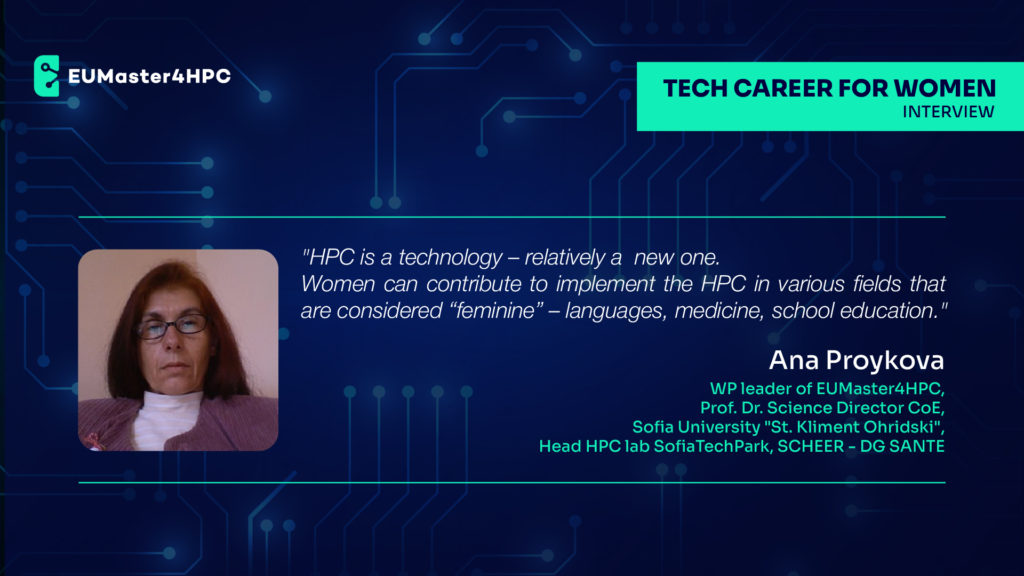Interview with Prof.Dr. Ana Proykova

“Tech Careers for Women” interview series as part of the EUMaster4HPC.
Ana Proykova is a full professor in Atomic and Molecular Physics, a Doctor of Sciences (Doctor Habil) in Theoretical and Mathematical Physics, and the Science Director of the Centre of Excellence in ICT. She is the Founder of the Bulgarian Centre of Women in Technologies, a member of the Equal Opportunity Committee of the European Physical Society that awards the Emmy Noether Distinction for Women in Physics.
_______________________________________________
Ana, you are doing incredible work to bring the world of equality, diversity and inclusion closer. We are honored to have you in the EUmaster4HPC project and to have Sofia University “St. Kliment Ohridski” as one of the EUMaster4HPC awarding universities!
Thank you for the kind greeting!
- Ana, could you share the important milestones of your professional journey: from start till today?
My professional journey has been very interesting, and I believe that the years ahead will bring more exciting events since the computational physics is developing fast! The important milestones are marked with changes of the area of research: my MS thesis was devoted to theoretical analysis of multiatomic chain; PhD research was in the computational nuclear physics; two post-docs in phase transformation of clusters of atoms and molecules with recognized contributions to science. In brief, every 5-7 years I changed the research area keeping physics as the major field. These days I am focusing more on the numerical methods (Monte Carlo, Molecular Dynamics, DFT) used in computational physics/chemistry/material science.
- Did you have any fears or biases at the start?
Not a fear but hesitation: I was in a junior musical school – playing piano. Hence my choice – Physics at the University was not approved by my granny and the other family members. Concerning bias – not at the start but at the higher professorship level: I got the Associate-Professor position at Sofia University 10 years after the defense of my PhD. An excuse for the delayed carrier development was that I had worked for many years abroad. In fact, most of women-professors all over the world face a delayed career at the highest-level stage – this I learnt during the execution of the project European Platform of Women-Scientists (EPWS) funded by the FP7. The EPWS is still operational, https://epws.org , which indicates that it is still needed.
- Did you face any challenges during your journey? If so, how did you overcome them?
By changing the field of research, one meets many challenges: the most difficult one is the need to convince the new research community that it is meaningful to take on the board the new-comer’s ideas. The good news is that physics provides experimental confirmation (from time to time) of a “crazy idea”, like the phase transitions of small systems being the label of our team at the University of Chicago.
- One of the aims of the EUMaster4HPC master’s programme is to encourage young women to choose technical careers, especially HPC. What is your vision about the future of HPC and what is the role of women in it?
It is important to encourage the girls to choose a career in STEM – at an age of 12-14 is the best time in my view. HPC is a technology – relatively a new one. Women can contribute to implement the HPC in various fields that are considered “feminine” – languages, medicine, school education. These “old” research areas need very much the HPC technology in order to achieve fascinating results like correlations of diseases with DNA specific changes.
- What was your mission in founding the Bulgarian Centre of Women in Technologies?
I was invited by a woman-engineer working in a large software company to transfer my knowledge accumulated in the EPWS to women devoted their carriers in software firms. Later, the BCWT became a part of the European platform of women. During the Bulgarian Presidency in the first half of 2018, we organized important events – many young women showed up and became active members of the BCWT.
- You are Professor in Atomic and Molecular Physics and Scientific Director of the Centre of Excellence in ICT and founder of the Bulgarian Centre of Women in Technologies; you are a member of the Equal Opportunities Committee of the European Physical Society. With such a background, can you highlight a few reasons why young women should not be afraid to enter the technical field?
The women are innovators by nature – there are many examples, but I would like to mention the top computer programming pioneer – Grace Hopper (1906-1992), the co-inventor of the COBOL computer language, which is the first universal programming language. Of course, Ada Byron (1815-1852) is well known for her work on Charles Babbage’s proposed mechanical general-purpose computer.
In my view, the main reason for a person to enter any field of research and development is the interest in that field. Once in the field anyone needs to rapidly absorb the specific knowledge for that field and to get skills necessary for being very good. The technical fields are not more difficult than music or dancing if the girls started to prepare themselves early.
- Ana, what drives you to endlessly grow and help women?
The rust in their ability to work with a high efficiency. The only help I provide is encouragement.
- We are convinced that your example will inspire many young girls to start their technical career. What advice would you give to women who are just thinking about pursuing a career in technology?
Be yourself!
Ask questions and check the answers!
The career in technology needs exactness – be aware of this!